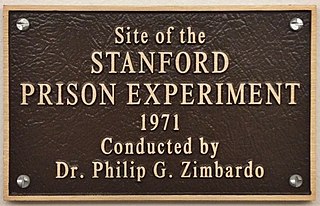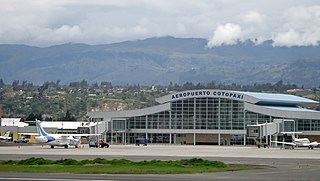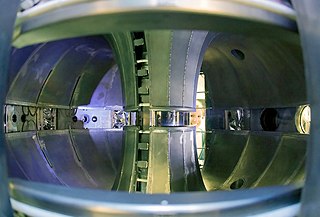
The Milgram experiment(s) on obedience to authority figures were a series of social psychology experiments conducted by Yale University psychologist Stanley Milgram. They measured the willingness of study participants, 40 men in the age range of 20 to 50 from a diverse range of occupations with varying levels of education, to obey an authority figure who instructed them to perform acts conflicting with their personal conscience. Participants were led to believe that they were assisting an unrelated experiment, in which they had to administer electric shocks to a "learner". These fake electric shocks gradually increased to levels that would have been fatal had they been real.

In quantum mechanics, Schrödinger's cat is a thought experiment that illustrates a paradox of quantum superposition. In the thought experiment, a hypothetical cat may be considered simultaneously both alive and dead, while it is unobserved in a closed box, as a result of its fate being linked to a random subatomic event that may or may not occur. This thought experiment was devised by physicist Erwin Schrödinger in 1935 in a discussion with Albert Einstein to illustrate what Schrödinger saw as the problems of the Copenhagen interpretation of quantum mechanics.

Princeton Plasma Physics Laboratory (PPPL) is a United States Department of Energy national laboratory for plasma physics and nuclear fusion science. Its primary mission is research into and development of fusion as an energy source. It is known in particular for the development of the stellarator and tokamak designs, along with numerous fundamental advances in plasma physics and the exploration of many other plasma confinement concepts.
The Wonderful Wizard of Oz or The Wizard of Oz most commonly refers to:
Transplant or Transplantation may refer to:

The mole salamanders are a group of advanced salamanders endemic to North America. The group has become famous due to the presence of the axolotl, widely used in research due to its paedomorphosis, and the tiger salamander which is the official amphibian of many US states, and often sold as a pet.

The Stanford prison experiment (SPE) was a psychological experiment conducted in the summer of 1971. It was a two-week simulation of a prison environment that examined the effects of situational variables on participants' reactions and behaviors. Stanford University psychology professor Philip Zimbardo led the research team who administered the study.

The Canadair CT-114 Tutor was the Royal Canadian Air Force (RCAF), and later Canadian Forces, standard jet trainer between the early 1960s and 2000. It was designed and produced by Canadian aircraft manufacturer Canadair.
Credence Systems Corporation was a manufacturer of test equipment for the global semiconductor industry, with a major focus on solving specific challenges facing the fast-growing consumer-driven semiconductor markets. Founded in 1978 by David Mees as Semiconductor Test Solutions, the company changed its name to Credence after acquiring Axiom and ASIX in 1990. The company's initial public offering was completed on October 28, 1993. It was publicly traded on the Nasdaq stock market under the symbol CMOS before the merger with LTX in 2008. It was headquartered in Milpitas, California, and was established in twenty countries.

Xcerra Corporation is an American semiconductor Automatic Test Equipment (ATE) vendor, founded in 1976 in (co-founder) Sol Max's basement, later moving to the Balco building in Newton & GTE building 3 in Needham, then the KLH building on University Ave. in Westwood and currently headquartered on University Ave. in Norwood, MA.

Verigy Ltd was a Cupertino, California-based semiconductor automatic test equipment manufacturer. The company existed as a business within Hewlett-Packard before it was spun off in 2006 as a standalone company. It was purchased by Advantest in 2011.

Emodepside is an anthelmintic drug that is effective against a number of gastrointestinal nematodes, is licensed for use in cats and belongs to the class of drugs known as the octadepsipeptides, a relatively new class of anthelmintic, which are suspected to achieve their anti-parasitic effect by a novel mechanism of action due to their ability to kill nematodes resistant to other anthelmintics.
Test(s), testing, or TEST may refer to:

A quasi-experiment is an empirical interventional study used to estimate the causal impact of an intervention on target population without random assignment. Quasi-experimental research shares similarities with the traditional experimental design or randomized controlled trial, but it specifically lacks the element of random assignment to treatment or control. Instead, quasi-experimental designs typically allow the researcher to control the assignment to the treatment condition, but using some criterion other than random assignment.

Cotopaxi International Airport is a high-elevation airport in Latacunga, the capital of the Cotopaxi Province in Ecuador. The airport is within a broad valley of the Ecuadoran Andes, with rising terrain east and west, and mountainous terrain distant in all quadrants.
Validity or Valid may refer to:

Lyngbyatoxin-a is a cyanotoxin produced by certain cyanobacteria species, most notably Moorea producens. It is produced as defense mechanism to ward off any would-be predators of the bacterium, being a potent blister agent as well as carcinogen. Low concentrations cause a common skin condition known as seaweed dermatitis.

The Lithium Tokamak Experiment (LTX), and its predecessor, the Current Drive Experiment-Upgrade (CDX-U), are devices dedicated to the study of liquid lithium as a plasma-facing component (PFC) at Princeton Plasma Physics Laboratory.
Rajesh Maingi is a physicist known for his expertise in the physics of plasma edges and program leadership in the field of fusion energy. He is currently the head of Tokamak Experimental Sciences at the U.S. Department of Energy's (DOE) Princeton Plasma Physics Laboratory (PPPL). He is a Fellow of both the American Physical Society and the American Nuclear Society and has chaired or co-chaired numerous national and international conferences.
This page is based on this
Wikipedia article Text is available under the
CC BY-SA 4.0 license; additional terms may apply.
Images, videos and audio are available under their respective licenses.












